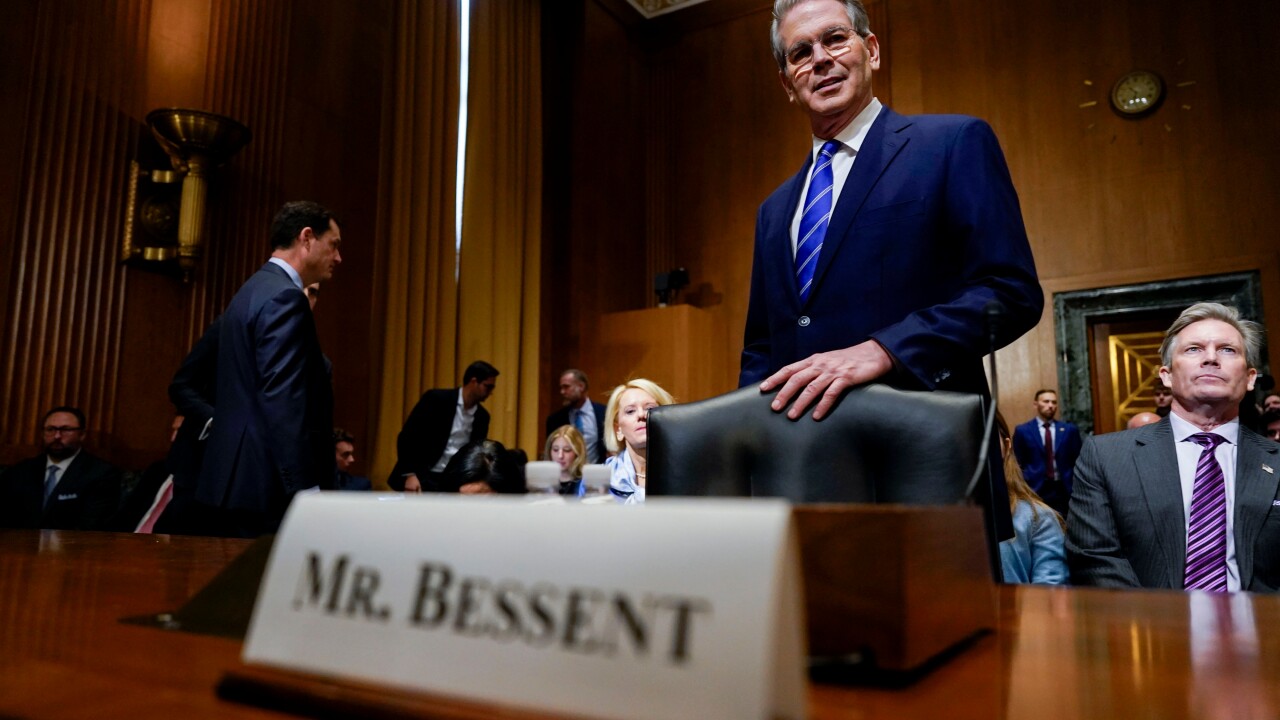WASHINGTON — As President-elect Donald Trump publicly weighed his choices for Treasury secretary, several names floated were well known to the banking industry, and would have taken the job with a host of clear priorities and positions.
But the choice of campaign finance chief Steven Mnuchin is not in that category, and — much like the president he wants to serve — he represents something of a question mark when it comes to his agenda.
Although Mnuchin isn't a stranger to banking, having worked at Goldman Sachs for 17 years and later playing a key role in recapitalizing and running a major bank, he doesn't have a policy record. In the past, he's given money to Hillary Clinton during her two bids for the Senate and her first race for president in 2008, suggesting he isn't even a committed Republican.
That may free him to cut deals with Democrats and push forward on a more moderate agenda, observers said.
His choice "likely indicates that his agenda will not be very radical, but largely modest reform of Dodd-Frank," said Mark Calabria, a former GOP Senate aide and now head of financial institutions research at the Cato Institute.
Mnuchin contrasts sharply with other top candidates who made the shortlist for Treasury, notably House Financial Services Committee Chairman Jeb Hensarling and former BB&T head John Allison, both of whom were hard-charging conservatives. Both men favored completely privatizing the mortgage market and repealing much of the Dodd-Frank Act. Both had also advocated for higher capital standards for banks in return for facing a simpler regulatory regime.
While that idea remains popular on Capitol Hill, it may be welcome news for big bankers if Mnuchin doesn't end up sharing that view, analysts said.
"At least initially, this should be a relief to banks that had been concerned about Jeb Hensarling or John Allison in the Treasury post, because those two have explicitly said they favor tougher capital requirements and would likely have used the job as a pulpit to influence legislation," wrote Ian Katz, a policy analyst with Capital Alpha Partners.
Jaret Seiberg, a policy analyst at Cowen Research, wrote that Mnuchin "is not ideological like Hensarling, which would suggest he could be more open to compromise with Democrats to get regulatory relief enacted into law."
Mnuchin is principally known in the industry for his recapitalization of the failed mortgage lender IndyMac, helping to return it to health as OneWest Bank and organize its sale to CIT Group. He joined the CIT board after the 2015 sale.
That experience is liable to be a focal point of his confirmation hearing, as Senate Democrats are likely to seize on accusations by consumer groups that OneWest foreclosed on struggling borrowers and discriminated against minorities.
"Steven Mnuchin, Donald Trump's reported pick for Treasury Secretary, made himself enormously wealthy by cashing in on the country's financial collapse," the liberal activist Take on Wall Street campaign said in a statement on Tuesday. "He purchased a bailed-out bank for pennies on the dollar and then aggressively foreclosed on tens of thousands of families."
Just two weeks ago, consumer groups leveled charges of redlining against CIT's OneWest.
"We call on HUD to fully investigate CIT's redlining practices and to hold the bank accountable for its actions, and the harm it has caused to communities," Kevin Stein, deputy director of the California Reinvestment Coalition, said two weeks ago.
Mnuchin is also likely to take heat for his past work at Goldman, a firm that was singled out for criticism by Trump himself on the campaign trail.
Progressives, including Sen. Elizabeth Warren, D-Mass., have said they would oppose former Goldman Sachs bankers tapped to be Treasury secretary.
"It doesn't matter whether it's a Wall Street CEO or a Washington insider who has fought to do Wall Street's bidding. … When Donald Trump promised change, I don't think voters thought he meant putting Wall Street back in charge of the economy," Sen. Jeff Merkley D-Ore., said in an email.
Sen. Sherrod Brown, the top Democrat on the Banking Committee, echoed that line of attack.
"President-elect Trump campaigned against big money's power in Washington and accused Wall Street and hedge funds of 'getting away with murder,' " the Ohio Democrat said. "But now he has picked a hedge fund manager whose Wall Street ties couldn't run deeper to lead the Treasury Department, which is exactly what this election showed the American people don't want. This isn't draining the swamp — it's stocking it with alligators."
Karl Frisch, executive director of the progressive group Allied Progress, slammed Trump for picking a "man who worked at Goldman Sachs – one of the banks responsible for the 2008 financial crisis — to run Treasury, the very government agency responsible for steering our country away from such economic disasters."
Whether objections over his time at Goldman and his role at OneWest will amount to much is unclear. Many Senate Democrats are likely to oppose Mnuchin, but he may find support from those who feared Trump would make a more ideological choice.
"The GOP control of the Senate should ensure he is confirmed, though this would be a fight," Seiberg said. "Housing advocates remain critical of OneWest's record of serving minorities and lower-income borrowers. And others question if OneWest got a sweetheart deal in acquiring IndyMac from the FDIC. We don't see these as substantive, but they could provoke political headaches."





